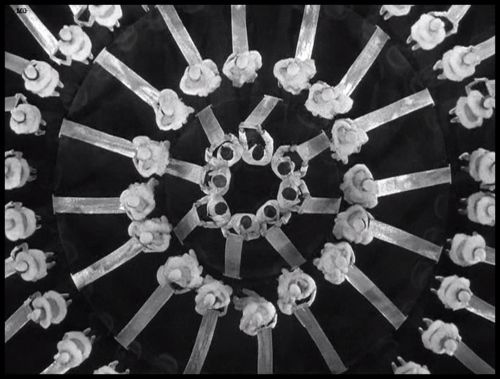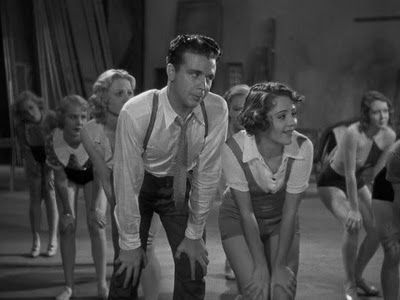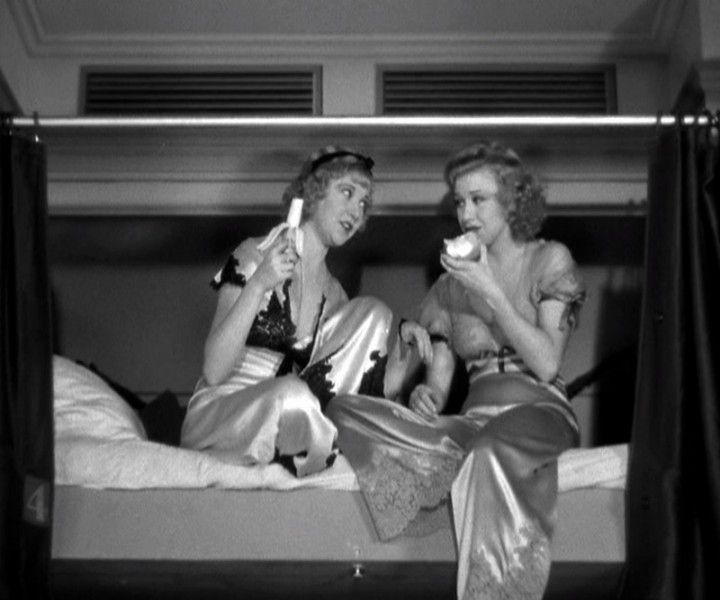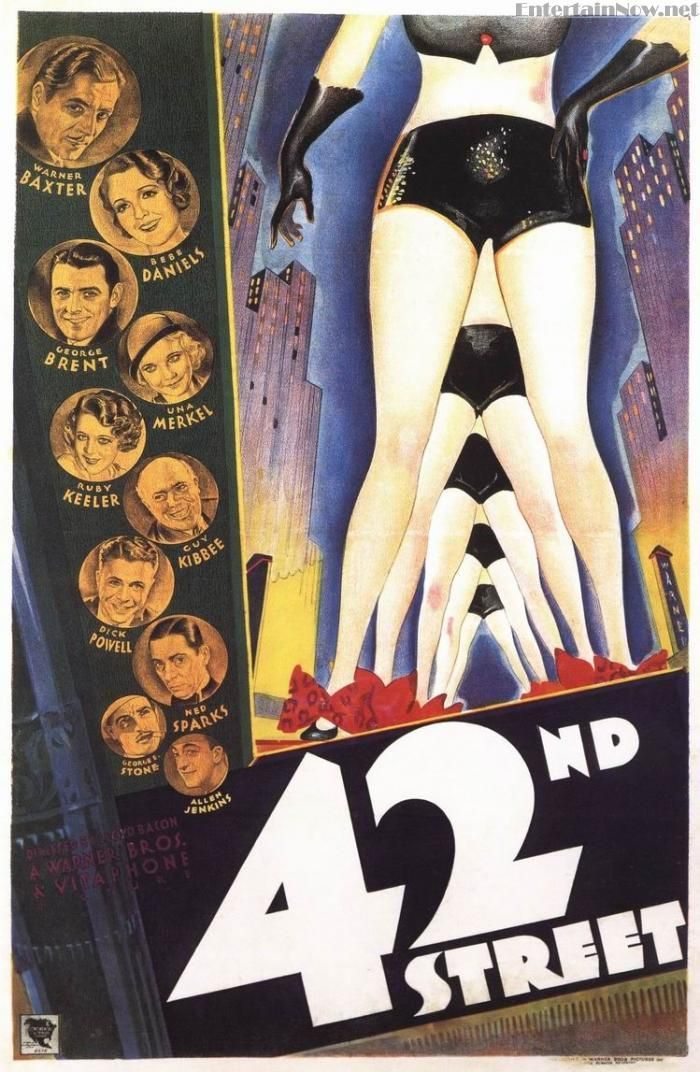42nd Street
1933
Producer: Busby Berkeley
Starring: Ruby Keeler, Ginger Rogers, Una Merkel, Dick Powell, Bebe Daniels, Warner Baxter
I’m going to admit something right now that is going to make me incredibly unpopular in film blogger circles. I love musicals. I do, god help me. I was raised on them; they are the cinema of my childhood. A weekend afternoon wasn’t complete without Gene Kelly or Fred Astaire singing and dancing. They remain my ultimate cinematic feel-good flicks.
Having said all of that, though, I will now say that despite my adoration, all musicals are not created equal. I can’t get enough of the Golden Age MGM musicals, with all their Technicolor glory and extended fantasy ballet sequences, but give me Rodgers and Hammerstein and I will leave the room. Early Hollywood musicals, which started as soon as sound in film began, were one of two varieties. There were the “Let’s put on a show!” musicals, the type to which 42nd Street belongs, where all the musical numbers take place in the context of a stage act and have precious little to do with what is going on in the film. Because this is what Busby Berkeley liked to do, these types of musicals also typically involved a ridiculously stagey and showy final dance number. The other variety of musical is the type where the musical numbers further the plot; or at very least, deal with the plot. You know the kind, where the hero sings about how much he loves the heroine right after meeting her. A theater needn’t be a part of the plot of these musicals; they can be about anything, and the song and dance numbers fit in with the overall emotional arc of the film. Think René Clair’s 1931 duology of Le Million and À Nous la Liberté.
Guess what: I love the latter type of musical, and am really not a fan of the former.
In case you forgot, 42nd Street is the former.
Perhaps the greatest showbiz myth ever, the plot of 42nd Street centers on Peggy Sawyer (Keeler), a newbie trying to make her way on Broadway. She shows up for an audition for Julian Marsh’s latest musical (Baxter), and a great deal of luck lands her in the chorus to Dorothy Brock’s (Daniels) lead. Rehearsals are tough and Sawyer passes out right into the loving arms of the singularly uninteresting Billy Lawler (Powell). A lot of random guff happens, people get drunk and fight, Siobhan stops paying attention to plot, then Dorothy breaks her leg and Peggy has to take over as lead at the very last minute. Like I said, greatest showbiz myth: chorus girl plucked from the back line to become the new star.
42nd Street is brief in its approximate 90 minute running time, but it drags on and on and on. And on. And then on some more. For a musical, there is almost no music in the first hour. The musical numbers for which it is remembered are all in the last twenty minutes of the film; up to that point, there are only so many times I can hear the strains of “Getting to Be a Habit With Me” before I want to punch someone. The final three musical numbers all come back to back to back, and they’re, frankly, a breath of fresh air in the otherwise dull film. I just wish they weren’t all saved until the end. It’s the classic “too little, too late” problem.
 |
| As pretty as this shot is, no musical talent was required to produce it. |
 |
| Snoooooooooooooore... |
 |
| Best part of the movie, right here. |
In short, the stage musical is everything that the film version is not.
Give me the stage musical of 42nd Street any day over Berkeley’s nonsense.
Arbitrary Rating: 4/10. AND I LOVE MUSICALS. If I were trying to turn someone onto the genre, this would be the last one I would show them.

"How on earth you [Ruby Keeler] became a musical star is beyond me."
ReplyDeleteShe was married to Al Jolson at the time.
I'll be honest: I've never really thought about breaking musicals into the different groupings that you did. I just approach each one as its own entity. Then again, I do that with every genre and movie regardless of who directed it or who stars in it.
I liked this movie quite a bit more than you. If the dance sequences you are referring to that you love are the ones like Gene Kelly's seemingly endless ballet dance at the end of An American in Paris then you and I definitely like opposites ends of the spectrum when it comes to musicals. If you are referring to the Astaire/Rogers ones (which you mention) then we are closer to being in sync. I've seen all 10 of their movies.
I just re-read my comment after posting and my "I'll be honest" paragraph comes across really stuck up or pretentious. I should have re-read it before I posted it.
DeleteWhat I meant to do is draw a parallel between how you see musicals vs. how I do, to that of many bloggers who see most/all films by their favorite directors to be great, whereas I tend to not much care who directed them; I just take each film as it comes, and if I dislike it, I dislike it no matter how great the director is. In others words, I tend to be out of the norm when it comes to following directors, so perhaps I am also out of the norm when it comes to my approach on musicals. Perhaps you have explained to me for the first time how others who like them see them.
Ha ha, no, I didn't take it as pretentious!! I guess I've just spent a lot of time thinking about musicals. And music. And music in film. And the myriad of ways music can be used in film. It's a topic that interests me greatly, so I've tried to analyze it and this is part of what I came up with.
DeleteYeah, see, I grew up with Gene Kelly and his scar and his ballet sequences, so, sorry, but I love them. And him. Prolly equal amounts both them and him. But I also way love the Astaire Rogers films. Haven't seen all of them, but I think I've seen about half of them!
I think as I was looking for photos for this review I came across that bit about Al Jolson. That certainly helps explain her baffling stardom.
How is it that bad movies make for far more interesting reviews? I had a lot of fun reading yours. I suppose Ruby Keeler would have been sacked and history if you had been 80 years earlier with that review, ha ha.
ReplyDeleteI have been thinking along the same lines as you in grouping musicals and while I totally agree that 42'nd street is sub-standard I actually prefer this kind to the oh-I-suddenly-feel-like-dancing-and-starting-to-sing-and where-did-that-music-suddenly-come-from kind of musicals. Though the staged perfomances are so elaborate that it is totally unrealistic they could take place on a stage, at least this is a natural place to start singing. Having said that there is also something self-tasting (don't even know if that is a proper English word) about a musical about a musical. It is like watching news abouts making news. More interesting for the people in the business than us outside. Still my personal favorite musical (there are not many of them) is "Footligth Parade. It is like 42'nd street, except here they actually do things right.
When I don't like a movie, I get very sarcastic, and yes, it tends to make for more amusing reviews!
DeleteAs I say in the review, I definitely prefer musicals where the musical numbers have something, ANYTHING to do with the plot, which tend to NOT be the ones where the characters put on a show, but that's me.
Footlight Parade is so much better than this movie - it has far more energy and pep!
I have a love-hate relationship with musicals; grwing up, I loved them, and still hold many in special places in my heart (Sound of Music, for one). I was also involved in show choir (singing and dancing) and theater in high school, and every spring we'd do a musical, so I was heavily inundated with musicals growing up. This has shortened my tolerance for them in the present day, but if I reach down into my childhood, I can usually still find something to appreciate. 42nd Street, however, did little for me, aside from offer a refreshing format change to providing proper context for musical numbers rather than the 'spontaneous-break-out-into-song' that musicals are known for, and TSorensen decried above.
ReplyDeleteIt was mostly the technicals that I had trouble getting over; this just isn't a well made movie at all, and as a filmmaker myself I could see everything that was going wrong with the production of this, and it just grew and grew and grew. Still, despite everything I just said, I liked this more than you did, though I don't see how this AND Footlight Parade AND Gold Diggers of 1933 all made the list when only one would've sufficed; they're all essentially the same film.
I can understand ODing on show musicals. Too bad, though. Dammit, I like the spontaneity of other musicals. Only me, apparently.
DeleteI didn't know you were a filmmaker. That's pretty cool, man!
So I'll jump in with both feet and admit that I kinda like Ruby Keeler. I didn't love her in this, but I liked her quite a bit in Footlight Parade.
ReplyDeleteYeah, I know. Adolysti is right, though--see one, you've seen 'em all, and this one is (I think) the least of the three.
I liked her as the staid secretary in Footlight Parade. As soon as they turned her into a dancer, I tuned her out.
DeleteAgreed on the "how many Busby Berkley movies do we need?" issue!!